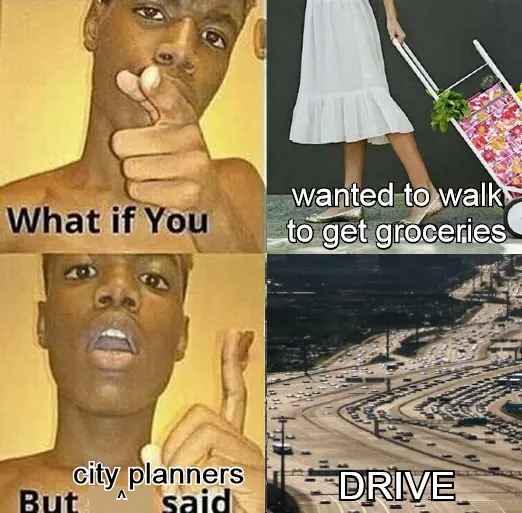Fuck Cars
A place to discuss problems of car centric infrastructure or how it hurts us all. Let's explore the bad world of Cars!
Rules
1. Be Civil
You may not agree on ideas, but please do not be needlessly rude or insulting to other people in this community.
2. No hate speech
Don't discriminate or disparage people on the basis of sex, gender, race, ethnicity, nationality, religion, or sexuality.
3. Don't harass people
Don't follow people you disagree with into multiple threads or into PMs to insult, disparage, or otherwise attack them. And certainly don't doxx any non-public figures.
4. Stay on topic
This community is about cars, their externalities in society, car-dependency, and solutions to these.
5. No reposts
Do not repost content that has already been posted in this community.
Moderator discretion will be used to judge reports with regard to the above rules.
Posting Guidelines
In the absence of a flair system on lemmy yet, let’s try to make it easier to scan through posts by type in here by using tags:
- [meta] for discussions/suggestions about this community itself
- [article] for news articles
- [blog] for any blog-style content
- [video] for video resources
- [academic] for academic studies and sources
- [discussion] for text post questions, rants, and/or discussions
- [meme] for memes
- [image] for any non-meme images
- [misc] for anything that doesn’t fall cleanly into any of the other categories
Recommended communities:
view the rest of the comments

Yeah, I definitely understand the heat issue. I grew up in the San Joaquin Valley, California, where the summers are also oppressively hot. Thankfully I'm living in Canada now, which is decidedly less hot (although it's far more humid).
I think it would come down to smarter, more localized urban design. For most of the history of human civilization, where we didn't have cars and air conditioning and the like, we had to be clever to carry out our daily life in a variety of climates. In hot, desert climates, cities were built more like this, building narrow alleys with tons of shade and designing for natural ventilation, keeping the whole city much cooler and more comfortable than the surrounding desert, even in extreme heat.
But what we have now is desert cities looking like Phoenix does:
An example of hot-climate urbanism done right (in Texas, no less!), however, is the San Antonio River Walk:
But yeah, these are more long-term things of course. But if we're talking about overhauling our car-centric urban design to allow people to walk to get groceries, we might as well talk about designing for the local climate, too.
Funny enough, I used to live near the SA River Walk. Well, not really near, but less than 30 minutes away which is kind of near in TX terms.
Thanks for the responses! The links go a long way to solidifying the point. I was always interested in the concept of this community and the Reddit one before it, but always had little questions that I hadn’t bothered to ask over there. Reddit wasn’t always friendly so I didn’t interact that much, life’s too short to get in online fights haha.
Same thing with central California in terms of distances lol. The city I grew up in is basically the armpit of California, and its main selling point is being "near" more interesting places like Sequoia, Kings Canyon, Yosemite, SF, and LA. But in this context "near" means "within 4-hour drive", of course.
But yeah, I think that's an interesting difference between the community here on lemmy vs back on reddit. Here, it's too small to get mostly fuckcars people, so we get a lot in from !all. The effect is generally a tampering of the circlejerk-y tendencies, although it does also sometimes mean getting more people completely opposed to reducing car dependency. In contrast, big subreddits can be so big that the main people who see content are those subscribed, so you get more of an echo chamber.
And as much as I love people who agree with me, it's also refreshing (and healthy) to not be in a complete echo chamber.